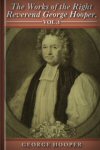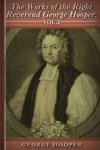The Works of George Hooper (2 vols.)
Digital Logos Edition
This product has been transferred from Community Pricing to Pre-Pub. The actual funding level may be lower than it appears, which could delay production. The amount of funding still needed will be evaluated and updated soon.
Overview
The Works of George Hooper collection presents this High Church theologian’s significant contributions to late seventeenth- and early-eighteenth-century Anglican thought and theology. Over the course of his long career, Hooper—bishop of Bath and Wells—was influential in Church politics and government. At the heart of this collection are eight sermons preached by Hooper before both royalty and the government. Other contributions include a treatise on the Church of England’s stance on papal influence and infallibility, Hooper’s reflections on the meaning of Lent, academic texts on mathematics and currency, and several Latin texts that Hooper was completing at the end of his life.
In the Logos editions, these valuable volumes are enhanced by amazing functionality. Scripture citations link directly to English translations, and important terms link to dictionaries, encyclopedias, and a wealth of other resources in your digital library. Perform powerful searches to find exactly what you’re looking for. Take the discussion with you using tablet and mobile apps. With Logos Bible Software, the most efficient and comprehensive research tools are in one place, so you get the most out of your study.
Key Features
- Presents the writings of an influential Anglican bishop
- Offers insights into controversy over the papacy between Roman Catholics and the Church of England
- Contains sermons presented to royalty and the government in the late seventeenth and early eighteenth centuries
Product Details
- Title: The Works of George Hooper
- Author: George Hooper
- Publisher: Oxford University Press
- Volumes: 2
- Pages: 920

This volume contains eight sermons preached by George Hooper from 1681 to 1713, for either royal or governmental audiences. It also includes a two-part discourse on the origin and significance of the Lenten fast, two discourses on the controversy between the Church of England and the Roman Catholics regarding the pope, and Hooper’s only mathematical work, “A Calculation of the Credibility of Human Testimony.”

Volume 2 includes “An Inquiry into the State of Measures; The Attic, the Roman, and Especially the Jewish,” with an appendix concerning the denominations and computation of English currency and measures of content. Here, Hooper defines “measures” as “either of length or surfaces or bodies.” It also includes three Latin works: De Benedictione Patriarchæ Jacobi, Gen. XLIX. Conjecturæ, Emendationes et Observationes ad Tertulliani adverseus Valentinianos Tractatum, and De Valentiniarnorum Hæresi, quibus illius origo ex Ægyptiacâ Theologiâ deducitur.
About George Hooper
George Hooper (1640–1727) was a High Church clergyman in the Church of England, who wielded a great deal of influence in the late seventeenth and early eighteenth centuries. He studied at Christ Church, Oxford, earning several degrees between 1657 and 1677—culminating in his DD in 1677. He also tutored and held various posts as a clergyman. In 1677, he became royal chaplain to Princess Mary and the Prince of Orange in Holland, and he held other prestigious chaplaincies until he was appointed bishop of St. Asaph in 1702. Soon after, he was offered the see of Bath and Wells, a position he held from 1704 until his death in 1727.
Reviews
0 ratings

Christopher Engelsma
4/23/2014
"Let us examine the story of the Protestant Reformation. Let us study the lives of its leading champions, Wycliffe and Huss and Luther and Ridley and Latimer and Hooper. Let us mark how these gallant soldiers of Christ stood firm against a host of adversaries and were ready to die for their principles. What battles they fought! What controversies they maintained! What persecution they endured! What tenacity of purpose they exhibited against a world in arms! And then let us remember that believing in an unseen Jesus was the secret of their strength. They overcame by faith." --J.C. Ryle